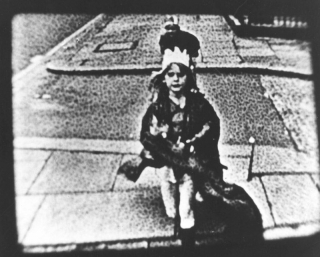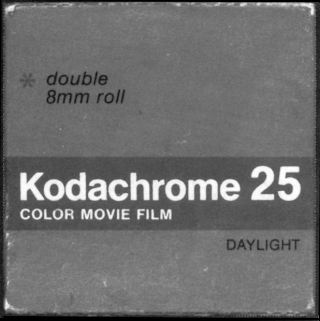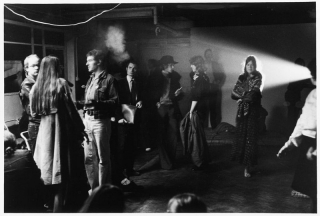Date: 28 May 2002 | Season: Shoot Shoot Shoot 2002 | Tags: Shoot Shoot Shoot
THE EPIC FLIGHT: MARE’S TAIL
Tuesday 28 May 2002, at 6:30pm
London Tate Modern
“From one flick of the mare’s tail came an unending stream of images out of which was crystalised the milky way. Primitive, picaresque cinema.” (David Larcher)
An extended personal odyssey which, through an accumulation of visual information, builds into a treatise on the experience of seeing. Its loose, indefinable structure explores new possibilities for perception and narrative.
David Larcher, Mare’s Tail, 1969, colour, sound, 143 min
Reinforcing the idea of the mythopoeic discourse and the historically romantic view of the artist-filmmaker, Mare’s Tail is a legend, consisting of layers of sounds and images that reveal each other over an extended period. It’s a personal vision, an aggregation of experience, memories and moments overlaid with indecipherable intonations and altered musics. The collected footage is extensively manipulated, through refilming, superimposition or direct chemical treatment. The observer may slip in and out of the film as it runs its course; it does not demand constant attention, though persistence is rewarded by experience after the full projection has been endured.
While studying at the Royal College of Art, David Larcher made a first film KO (1964-65, with soundtrack composed by Philip Glass), which was subsequently disassembled and small sections incorporated in Mare’s Tail (a recurrent practise that continues through his later works). Encouraged by contact with true independent filmmakers like Peter Whitehead and Conrad Rooks, Larcher set out on to document his own life in a quasi-autobiographical manner.
Though financed by wealthy patron Alan Power, Mare’s Tail was, in its technical fabrication, a self-sufficient project made before the Co-op had any significant workshop equipment. At times, Larcher was living in a truck, and stories of films processed in public lavatories in the Scottish Highlands do not seem far from the truth. His relationship to the Co-op has always been slightly distanced, though his lifestyle impressed and influenced many of the younger, more marginal figures.
His next film, Monkey’s Birthday (1975, six hours long), was shot over several years’ travels across the world with his entourage, and this time made full use of the Co-op processor to achieve its psychedelic effect.
Screening introduced by David Larcher.
PROGRAMME NOTES
THE EPIC FLIGHT: MARE’S TAIL
Tuesday 28 May 2002, at 6:30pm
London Tate Modern
MARE’S TAIL
David Larcher, 1969, colour, sound, 143 min
“Now you see it, now you don’t. Waiting room cinema from the mountain top to the car park, an alternative to television. The good, the bad and the indifferent. Some consider it self-indulgent but me has a duty to itself. Bring what you expect to find. Not structural but starting in the beginning from the beginning…organic…prima materia…impressionable massa confusa…out of which some original naming and ordering processes spring…they are not named, but rather nailed into the celluloid. “Please don’t expect me to answer the question I’m having a hard time not falling out of this chair” syndrome.” —David Larcher, Arts Council Film-Makers on Tour catalogue, 1980
“Mare’s Tail is an epic flight into inner space. It is a 2 and 3/4 hour visual accumulation in colour, the film-maker’s personal odyssey, which becomes the odyssey of each of us. It is a man’s life transposed into a visual realm, a realm of spirits and demons, which unravel as mystical totalities until reality fragments. Every movement begins a journey. There are spots before your eyes, as when you look at the sun that flames and burns. We look at distant moving forms and flash through them. We drift through suns; a piece of earth phases over the moon. A face, your face, his face, a face that looks and splits into shapes that form new shapes that we rediscover as tiny monolithic monuments. A profile as a full face. The moon again, the flesh, the child, the room and the waves become part of a hieroglyphic language… Mare’s Tail is an important film because it expresses life. It follows Paul Klee’s idea that a visually expressive piece adds “more spirit to the seen” and also “makes secret visions visible”. Like other serious films and works of art, it keeps on seeking and seeing, as the film-maker does, as the artist does. It follows the transience of life and nature, studying things closely, moving into vast space, coming in close again. The course it follows is profoundly real and profoundly personal: Larcher’s trip becomes our trip to experience. It cannot be watched impatiently, with expectation; it is no good looking for generalization, condensation, complication or implication.” —Stephen Dwoskin, Film Is: The International Free Cinema, 1975
“A film that is almost a life style. Long enough and big enough in scope to be able to safely include boredom, blank-screens, bad footage. The kind of film that is analogous in a symbolic way to something like the ‘stream of life’ – no one would ever criticize looking out of the window as being boring sometimes. It’s not a film – more like an event composed of the collective ideas and attempts in film of several years. Like a personal diary: humorous, wry, sad, ecstatic. Concerned with texture, with seeing and not seeing, light and darkness, even life and death. Monumental not in size alone, but in its breadth of concept. Relaxed enough to be able to let one idea run on for twenty minutes before switching to another. The exact opposite of most film-making which attempts to keep the audience ‘interested’ by rapidly changing from one form or idea to another, to exclude boredom and participation. A ‘super-Le Grice’ in that it has inherent sensitivity and humanity, as well as superlative and highly inventive technique. It opens up film-making by including such self-conscious ethics as those propounded by Warhol etc. as a natural part of the film ethic as a whole.” —Mike Dunford, Cinemantics No. 1, January 1970
“Mare’s Tail is one of the finest achievements in cinema. It is a masterpiece that everyone in the country should get to see. To write about it is about as difficult as conveying the essence of magic, the meaning of existence, the quality of love or the shadows of a receding dream. For the film is pure myth, a living organism in its own right, a creation whose infinite complexity makes criticism of it a shallow irrelevancy (or at best a crude mythology). The achievement is that the film never looks like a mere catalogue of special effects – the vision is integrated, relaxed, spontaneous and too fluid for there to be any sense of contrivance in this staggering display of inventive curiosity. The immense diversity of technique runs hand-in-hand with a sustained simplicity of treatment. You’re aware of a mind that is open and loving toward everything: and this loving openness of response transfigures every image in the film, as it eventually transfigures the viewer too…” —John Du Cane, Time Out, 1972
“A film that is undoubtedly one of the most important produced in this country and that stands comparison with the best from the United States. It’s as if it were the first film in the world. When Mare’s Tail first appeared it was compared to Brakhage’s Art of Vision, as an examination of ways of seeing. The comparison can be taken further: as Brakhage is to the New American Cinema, it seems to me, so Larcher should be considered to the New English Cinema… Mare’s Tail is not only about vision but proposes an epistemology of film, particularly in its first reel: revealing basic elements of film in an almost didactic fashion: grain, frame, strip, projector, light. We see a film in perpetual process, being put together, being formed out of these attitudes. The first reel is a ‘lexicon’ to the whole film – to film in general – holding together what is essentially an open-ended structure to which pieces could be continually added and offering us a way to read that film. It is at once a kind of autobiography and a film about making that autobiography.” —Simon Field, “The Light of the Eyes”, Art and Artists, December 1972
“Pierre Boulez came to a screening of Mare’s Tail at Robert Street once. Simon Hartog said, “Oh, I sent my father to see Mare’s Tail”, his father was an impresario for people like Joan Sutherland and Pierre Boulez, and it turned out that Boulez came and was sat behind us. I’d been living in trucks and I’d just come up and it happened to be the same day. I went along and found this old tramp called Eric – this famous character who was around in those days, early ’70s – and took him along. We were sitting there and then I suddenly realised Boulez was behind. After half an hour he said, “C’est le perfection,” and walked out with Simon’s father!” —David Larcher, interview with Mark Webber, 2001
Back to top
Date: 29 May 2002 | Season: Infinite Projection, Shoot Shoot Shoot 2002 | Tags: Shoot Shoot Shoot
8MM FILMS FROM THE LONDON CO-OP
Wednesday 29 May 2002, at 7:30pm
London The Photographers’ Gallery
The home movie format of 8mm can empower artists to make extremely personal and direct film observations. Spontaneity and intimacy are inherent to this pocket sized system. This special evening of single and multi-screen small gauge wonders concludes Shoot Shoot Shoot, a major retrospective of British avant-garde film, which screens at Tate Modern throughout May. Many of the makers will be on hand to introduce their work.
David Crosswaite, Puddle, UK, 1968, b/w, silent, 4 min
Mike Dunford, Four Short Films, UK, 1969, b/w & colour, silent, 10 min
Mike Dunford, One Million Unemployed in Winter 1971, UK, 1971, colour, sound-on-tape, 4 min
Jeff Keen, Wail, UK, 1960, colour, silent, 5 min
Jeff Keen, Like the Time is Now, UK, 1961, colour, silent, 6 min
Malcolm Le Grice, China Tea, UK, 1965, colour, silent, 10 min
Annabel Nicolson, Black Gate, UK, 1976, colour, silent, 4 min
Sally Potter, Jerk, UK, 1969, b/w, silent, 3 min (two screen)
William Raban, Sky, UK, 1969, colour, silent, 5 min (four screen)
John Smith, Out the Back, UK, 1974, colour, silent, 4 min
David Crosswaite, Mike Dunford, Malcolm Le Grice, Sally Potter, William Raban and John Smith in attendence.
PROGRAMME NOTES
8MM FILMS FROM THE LONDON CO-OP
Wednesday 29 May 2002, at 7:30pm
London The Photographers’ Gallery
IN CELEBRATION OF 8MM
“What first attracted me to 8mm film in particular was its materiality and the way it produced tangibility problematics on all levels: the acquiring and setting up of increasingly scarce, quality projection equipment, the physicality of the sound made by the film strip running through the projector gate continuously reminds the viewer of the machine’s presence in the room, the attention to projection speed (variable fps), and the frequent act of projecting camera originals (the horror!) instead of film prints. And then there is the film itself – the sensuous texture of the projected image, the subtlety or sumptuousness of gradations in black-and-white or the discriminating use of colour, the graininess of the image (as emotionally satisfying and particular as the actual silver sparkles on 35mm nitrate stock), the unpredictability of the sound stripe, and the fragility and fleeting sense of the image’s presence on the screen. All these qualities contribute to the intimacy created between the projected films and any group able to give themselves over to the act of actually seeing.” (Jytte Jensen, Museum of Modern Art, in the exhibition catalogue “Big As Life”, 1999)
Back to top
Date: 1 June 2002 | Season: Shoot Shoot Shoot 2002 | Tags: Shoot Shoot Shoot
SHOOT SHOOT SHOOT: THE FIRST DECADE OF THE LONDON FILM-MAKERS’ COOPERATIVE & BRITISH AVANT-GARDE FILM 1966-76
June 2002–August 2002
International touring exhibition consisting of eight programmes of single-screen, double screen films and expanded cinema
May 2002 – London, UK – Tate Modern
June 2002 – Paris, France – Scratch Projections at Centre Wallonie Bruxelles / EOF Gallery
July 2002 – Brisbane, Australia – Brisbane International Film Festival / Institute for Modern Art
July 2002 – Melbourne, Australia – Melbourne International Film Festival / Experimenta / Gamma Space
September 2002 – Berlin, Germany – Arsenal / Deutsche Kinemathek
September 2002 – Karlsruhe, Germany – Kinemathek / Kamera Kunstverein
September 2002 – Frankfurt, Germany – Deutsches Filmmuseum
September 2002 – Bremen, Germany – Kino 46 / Hochschule für Künste
October 2002 – Hamburg, Germany – Metropolis Kino / Lichtmeß
November 2002 – Basel, Switzerland – Kunsthalle Basel / Stadtkino Basel
November 2002 – Barcelona, Spain – Fundació Antoni Tàpies / Hangar
November 2002 – Vitoria-Gasteiz, Spain – ARTIUM
March 2003 – New York. USA – Anthology Film Archives / Galapagos Art Space
May 2003 – Manchester, UK – Cornerhouse
May 2003 – Gateshead, UK – BALTIC / Side Cinema
March 2004 – Athens, Greece – Deste Foundation
April 2004 –Tokyo, Japan – Image Forum Festival / Hillside Gallery
May 2004 – Kyoto, Japan – Goethe Institut Kyoto
August 2004 –Seoul, Korea – 1st Seoul Experimental Film Festival


